A TRUBUTE TO THE VETERANS
World War I(redirected from War to End All Wars) |
World War I was an international conflict primarily involving European nations that was fought between 1914 and 1918. The United States did not enter the conflict until April 1917, but its entry was the decisive event of the war, enabling the Allies (Great Britain, France, Italy, and Russia) to defeat the Central Powers (Germany, Austria-Hungary, Turkey, and Bulgaria). The leadership of President woodrow wilson led to both the conclusion of hostilities and the creation of the League of Nations, an international organization dedicated to resolving disputes without war.
The war began on July 28, 1914, when Austria-Hungary declared war on Serbia. During the late nineteenth century, European nations had negotiated military alliances with each other that called for mutual protection. The Austria-Hungary declaration of war triggered these alliance commitments, leading to the widening of the war between the Allies and Central Powers.
During the next four years, the war was fought primarily on three fronts and on the Atlantic Ocean. The western front was in France, where Germany was opposed by France, Great Britain, and eventually the United States. The eastern front was in Russia, where Germany and Austria-Hungary opposed Russia. The southern front was in Serbia and involved Austria-Hungary and Serbia.
In August 1914 Germany invaded Belgium and then moved into France. German forces were unable to achieve a decisive victory, however, ever, and the war soon became a conflict of fixed battle lines. French, British, and German soldiers lived and fought in trenches, periodically making assaults on the enemy by entering the "no man's land" between the two sets of trenches. The use of machine guns, tanks, gas warfare, and artillery in these confined battlefields generated unprecedented human carnage on the western front.
Though Germany had more success on the eastern front, neither side had sufficient economic and military strength to achieve victory. In 1916 and early 1917, Wilson sought to bring about negotiations between the Allies and Central Powers that would lead, in his words, to "peace without victory." Wilson's efforts at first appeared promising, but German military successes convinced the Central Powers that they could win the war.
Germany's use of submarine warfare proved to be the key element in provoking the United States' entry into the war. In 1915 a German submarine had torpedoed without warning the British passenger steamship Lusitania off the southern coast of Ireland. Nearly 1,200 persons died, including 128 U.S. citizens. Popular feeling in the United States against Germany was intense, leading to calls for declaring war on Germany. Wilson, however, sought a diplomatic solution. Though Germany rebuked his call for assuming responsibility for the tragedy, it did not sink any more passenger liners without warning.
Wilson abandoned his peacemaking efforts when Germany announced that unrestricted submarine warfare would begin on February 1, 1917. This meant that U.S. merchant ships were in peril, despite the fact that the United States was a neutral in the war. Wilson broke diplomatic relations with Germany on February 3 and asked Congress later that month for authority to arm merchant ships and take other protective measures. In mid-March German submarines sank three U.S. merchant ships, with heavy loss of life. Wilson called a special session of Congress for April 2 and asked for a declaration of war on Germany. Congress obliged, and on April 6, 1917, Wilson signed the declaration.
The United States immediately moved to raise a large military force by instituting a military draft. It took months, however, to raise, train, and dispatch troops to Europe. The first 85,000 members of the American Expeditionary Force (AEF), under the command of General John J. Pershing, arrived in France in June 1917. By the end of the war in November 1918, there were 2 million soldiers in the AEF.
Germany realized that U.S. war production and financial strength reduced Germany's chances of victory. In March 1918 Germany launched its last great offensive on the western front. U.S. troops saw their first extended action in the Battle of the Marne, halting the German advance on June 4. During the second Battle of the Marne, U.S. and French troops again stopped the German advance and successfully counterattacked. The Allies began pushing back the German army all along the western front, signaling the beginning of the end of German resistance.
Wilson renewed his peace efforts by proposing a framework for negotiations. On January 8, 1918, he delivered an address to Congress that named Fourteen Points to be used as the guide for a peace settlement. The fourteenth point called for a general association of nations that would guarantee political independence and territorial integrity for all countries. In October 1918 Germany asked Wilson to arrange a general Armistice based on the Fourteen Points and the immediate start of peace negotiations. Germany finally capitulated and signed an armistice on November 11, 1918.
The 1919 Treaty of Versailles ended World War I and imposed disarmament, reparations, and territorial changes on Germany. The treaty also established the League of Nations, an international organization dedicated to resolving world conflicts peacefully. Wilson, however, was unable to convince the U.S. Senate to ratify the treaty, because it was opposed to U.S. membership in the League of Nations.
World War I also saw the 1917 Bolshevik revolution in Russia. The specter of a worldwide Communist movement generated fears in the United States that socialists, anarchists, and Communists were undermining democratic institutions. During the war, socialist opponents of the war were convicted of Sedition and imprisoned. In 1920 the federal government rounded up 6,000 Aliens who it considered to be politically subversive. These "Palmer Raids," named after Attorney General A. mitchell palmer, violated basic civil liberties. Agents entered and searched homes without warrants, held persons without specific charges for long periods of time, and denied them legal counsel. Hundreds of aliens were deported.
Veterans Day
Veterans' statistics, history of the holiday, war poetry, and more
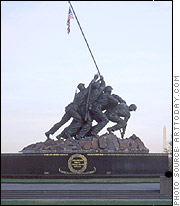 Iwo Jima Memorial, Washington, D.C. 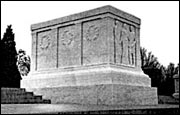 Tomb of the Unknowns, Arlington National Cemetery, Arlington, Va. |
Armistice Day Becomes Veterans Day
World War I officially ended on June 28, 1919, with the signing of the Treaty of Versailles. The actual fighting between the Allies and Germany, however, had ended seven months earlier with the armistice, which went into effect on the eleventh hour of the eleventh day of the eleventh month in 1918. Armistice Day, as November 11 became known, officially became a holiday in the United States in 1926, and a national holiday 12 years later. On June 1, 1954, the name was changed to Veterans Day to honor all U.S. veterans.
In 1968, new legislation changed the national commemoration of Veterans Day to the fourth Monday in October. It soon became apparent, however, that November 11 was a date of historic significance to many Americans. Therefore, in 1978 Congress returned the observance to its traditional date.
Tomb of the Unknowns
Official, national ceremonies for Veterans Day center around the Tomb of the Unknowns.
To honor these men, symbolic of all Americans who gave their lives in all wars, an Army honor guard, the 3d U.S. Infantry (The Old Guard), keeps day and night vigil.
At 11 a.m. on November 11, a combined color guard representing all military services executes "Present Arms" at the tomb. The nation's tribute to its war dead is symbolized by the laying of a presidential wreath and the playing of "Taps."
Unknown Soldier Identified
On Memorial Day (which honors U.S. service people who died in action) in 1958, two more unidentified American war dead, one from World War II and the other from the Korean War, were buried next the unknown soldier of World War I.
A law was passed in 1973 providing interment of an unknown American from the Vietnam War, but because of the improved technology to identify the dead, it was not until 1984 that an unidentified soldier was buried in the tomb.
In 1998, however, the Vietnam soldier was identified through DNA tests as Michael Blassie, a 24-year-old Air Force pilot who was shot down in May of 1972 near the Cambodian border. His body was disinterred and reburied by his family in St. Louis, Missouri.
Excerpts from memorial poems by some of the world's greatest poets, including William Shakespeare, Emily Dickinson, and E. E. Cummings. Commemorate Memorial Day, Veterans Day, or any day when you would like to honor loved ones, with these lovely verses.
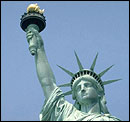 Stop all the clocks, cut off the telephone, Prevent the dog from barking with a juicy bone, Silence the pianos and with muffled drum Bring out the coffin, let the mourners come. —W. H. Auden, from "Funeral Blues" |
Death arrives among all that sound like a shoe with no foot in it, like a suit with no man in it, comes and knocks, using a ring with no stone in it, with no finger in it, comes and shouts with no mouth, with no tongue, with no throat. Nevertheless its steps can be heard and its clothing makes a hushed sound, like a tree. —Pablo Neruda, from "Nothing But Death" |
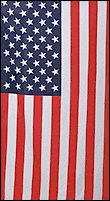 When to the sessions of sweet silent thought I summon up remembrance of things past, I sigh the lack of many a thing I sought, And with old woes new wail my dear time's waste: Then can I drown an eye, unused to flow, For precious friends hid in death's dateless night, And weep afresh love's long since cancelled woe, And moan the expense of many a vanished sight. Then can I grieve at grievances foregone, And heavily from woe to woe tell o'er The sad account of fore-bemoanèd moan, Which I new pay as if not paid before. But if the while I think on thee, dear friend, All losses are restored and sorrows end. —William Shakespeare, Sonnet 30 |
A train went through a burial gate, A bird broke forth and sang, And trilled, and quivered, and shook his throat Till all the churchyard rang; And then adjusted his little notes, And bowed and sang again. Doubtless, he thought it meet of him To say good-by to men. —Emily Dickinson, "A train went through a burial gate" |
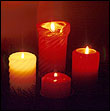 Memorial day. Bitter salt is dressed up as a little girl with flowers. The streets are cordoned off with ropes, for the marching together of the living and the dead. Children with a grief not their own march slowly, like stepping over broken glass. —Yehuda Amichai, from "Memorial Day for the War Dead" |
Our birth is but a sleep and a forgetting: The Soul that rises with us, our life's Star, Hath had elsewhere its setting, And cometh from afar: Not in entire forgetfulness, And not in utter nakedness, But trailing clouds of glory do we come From God, who is our home: Heaven lies about us in our infancy! —William Wordsworth, "Ode: Intimation of Immortality" |
Do not go gentle into that good night, Old age should burn and rave at close of day; Rage, rage against the dying of the light. —Dylan Thomas, "Do not go gentle into that good night" |
 Into this neutral air Where blind skyscrapers use Their full height to proclaim The strength of Collective Man, Each language pours its vain Competitive excuse: But who can live for long In an euphoric dream; Out of the mirror they stare, Imperialism's face And the international wrong. —W. H. Auden, from "September 1, 1939" |
though dull were all we taste as bright, bitter all utterly things sweet, maggoty minus and dumb death all we inherit,all bequeath and nothing quite so least as truth —i say though hate were why men breathe— because my Father lived his soul love is the whole and more than all 
Freedom is never free. The most persistent sound which reverberates through men's history is the beating of war drums. We often take for granted the very things that most deserve our gratitude. When eating bamboo sprouts, remember the man who planted them. It is easy to take liberty for granted, when you have never had it taken from you. This nation will remain the land of the free only so long as it is the home of the brave. I dream of giving birth to a child who will ask, "Mother, what was war?" I think there is one higher office than president and I would call that patriot. When our perils are past, shall our gratitude sleep? Courage is almost a contradiction in terms. It means a strong desire to live taking the form of readiness to die. She mourned with a bleak blank determination, marching straight ahead with a shell-shocked vet's hollow-eyed thousand-yard stare while doing the next thing and the next. In war, there are no unwounded soldiers. As we express our gratitude, we must never forget that the highest appreciation is not to utter words, but to live by them. Valor is stability, not of legs and arms, but of courage and the soul. In the beginning of a change, the patriot is a scarce man, and brave, and hated and scorned. When his cause succeeds, the timid join him, for then it costs nothing to be a patriot. Lord, bid war's trumpet cease; How important it is for us to recognize and celebrate our heroes and she-roes! But fame is theirs - and future days; On pillar'd brass shall tell their praise; Shall tell - when cold neglect is dead - "These for their country fought and bled." But the freedom that they fought for, and the country grand they wrought for, Is their monument to-day, and for aye. The more we sweat in peace the less we bleed in war. How far that little candle throws his beams! So shines a good deed in a weary world. |